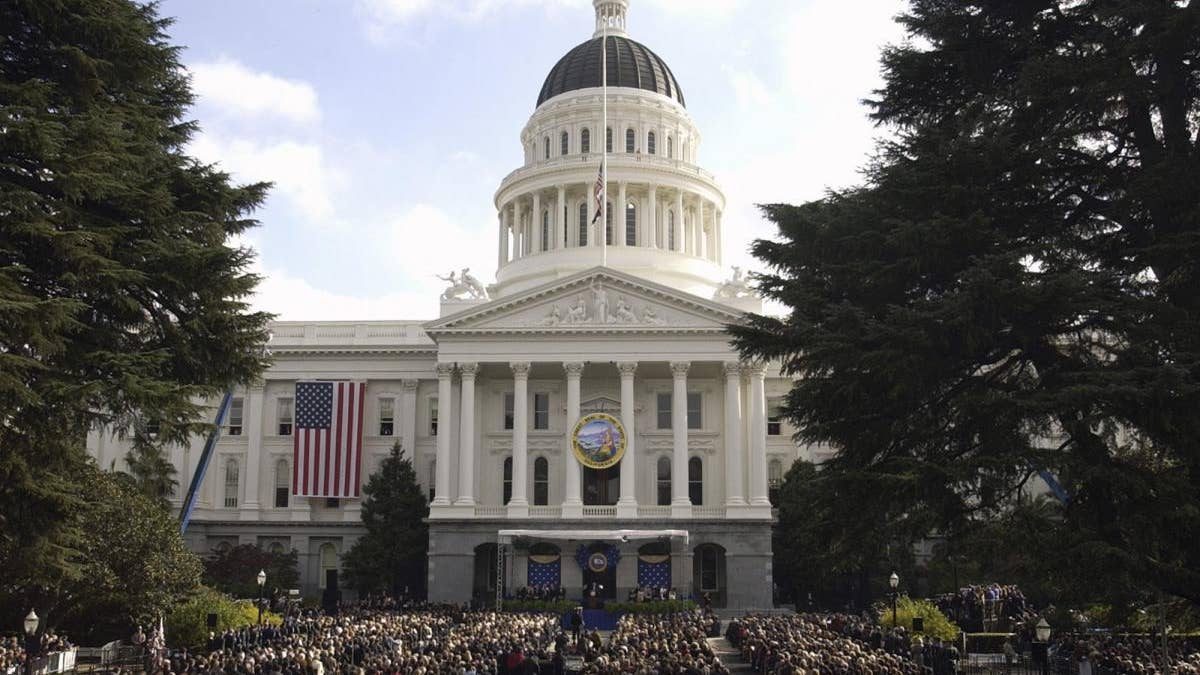
California State Capitol (AP Photo/Ben Margot, File)
Washington is in a tizzy over the ever-expanding federal debt, and questions about dealing with it are piling up almost as quickly as IOUs at the Treasury Department.
Will Republicans vote to extend the debt ceiling beyond the current $14 trillion cap? Is President Obama serious about bucking his own party to push for entitlement reductions? Will the Federal Reserve's debt buying spur inflation and kill the nascent recovery?
On the state level, though, there are no such complexities. The only question that really matters is: How?
How will states close the combined $113 billion budget gap for the coming year? How much will taxes go up? How many government workers will be laid off? How will residents get by with fewer services?
On the federal level, the discussion of debt and deficit takes on disorienting qualities. During the recent lame-duck session of Congress, some of the same people who are warning about the catastrophic consequences of the debt turned around and supported legislation that added to the pile.
The lame duckers passed nearly a trillion dollars in new spending, including a three-month extension of current government outlays (plus a $1.16 billion boost for good measure), an extension of long-term unemployment benefits and subsidies for pet projects.
President Obama explained that this was short-term debt necessary to keep the economy from snuffing out. This kind of debt, he said, is acceptable. But the long-term debt required by obligations for entitlement programs is unacceptable. Debt now is good. Debt later is bad. Got it?
There's truth to what he says, but it also highlights the surreality of the deficit situation in Washington.
There are immediate consequences to the massive federal debt, like driving up the price the government has to pay for borrowing money and weakening the dollar, the federal government has hardly run out of credit. But it's still a matter of choice as to whether politicians in Washington will address the problem.
The message from Obama's deficit commission last month was that if the government made difficult decision now in the form of spending cuts and limiting tax deductions it could avoid the kinds of brutal austerity measures currently coming down on Europe.
And, if Americans don't have the stomach for preventative medicine now, the Federal Reserve can always print more money. It's called "monetizing" and it means intentionally devaluing your currency so that you repay old debts with cheap new dollars.
This is the national equivalent of paying off one credit card with another, but that doesn't mean it's out of the question.
For state governments, though, there are no printing presses and no lines of credit. States can actually run out of money. And in 46 states, lawmakers are currently facing shortfalls with no easy ways to close the gap.
In the previous two budget years, the federal government ended up bailing out struggling states. In fiscal years 2010 and 2011, states received a combined $127 billion in federal bailouts from stimulus packages -- enough to cover more than a third of the total shortfall.
That money will not be there this time around, even though the budget picture in many states is worse now than during the immediate aftermath of the Panic of 2008.
Illinois is on track to have half of the money required to fund the fiscal year that begins in July - a $17 billion gap. The next worse off are New Jersey and Nevada, which are both projecting shortfalls equal to 37 percent of their budgets. California has a projected gap of a mere 22 percent, but in America's largest state, that means coming up with revenues or cuts equal to $19.2 billion.
Some, like New Jersey's Gov. Chris Christie and incoming Nevada Gov. Brian Sandoval have made tough proposals about tackling the issue that have won plaudits from fiscal hawks, but for Illinois and California, there is considerably less optimism.
Many of the costs, like pensions and payments on bonds taken out for projects begun in palmy days, can't be trimmed. And tax rates in both states are already driving taxpayers, especially the rich ones, out of both states. Any more increases could mean a loss, not a gain, in government revenue.
Which brings us back to Washington. If states start coming up short and defaulting on bonds and pension payments, will the federal government provide emergency relief? Many Republican budget bashers may say no way, but the pressure to act would be intense.
If a state the size of California or Illinois actually defaulted, it would send shockwaves through financial markets and create aftershocks in other states and the private sector as lenders recoil.
Strong economies in Europe like Germany and Britain have paid a heavy price for the fiscal catastrophe in Greece. And countries on the brink of insolvency, like Spain, Portugal and Ireland, may be pushed over as lenders pull back.
Politicians in both parties in Washington have pledged to make next year all about fiscal restraint. But if California, which has an economy six times larger than Greece's, is headed for collapse, will lawmakers really refuse them?
It might be hard to explain to a spending-averse electorate that it's necessary to dole out a sum that could dwarf the $127 billion already spent on state bailouts. But faced with warnings of another financial crisis, lawmakers might say they have no choice.




